Table of Contents: 2014 articles
These are all the columns published in the seventh year of Offbeat Oregon History. (Click here to jump to most recent year)
These are all the columns published in the seventh year of Offbeat Oregon History. (Click here to jump to most recent year)
319 |
December 28, 2014 |
Roseburg “Champagne Riot” likely wasn't what you thinkThe year after the Civil War ended, partisans of North and South still clung to their resentments in Douglas County. On Christmas Day, those hard feelings broke out in a knock-down-drag-out that left two men dead. |
 |
•Roseburg |
318 |
December 21, 2014 |
Oregon Senator almost became President; luckily, he didn'tNew York schemers sought to have Joseph Lane named President. Had they succeeded, the Civil War likely would have been the North seceding from the South, and possibly an independent Pacific Republic in the West. |
 |
•1860 |
317 |
December 14, 2014 |
Simpson empire made Coos Bay a shipbuilding MeccaAsa Mead Simpson came out West for the Gold Rush, but he soon learned there was more money in the timber that blanketed its hills than would ever be scratched out of its rapidly dwindling gold mines. |
 |
•North Bend |
316 |
December 7, 2014 |
Free-love “Harmonial Brotherhood” colony was a disasterThe catastrophic failure of several of the Utopian cult's articles of faith — especially on matters of diet and health care — had doomed the community to misery and sickness before it even got a start. |
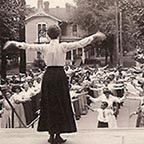 |
•Honduras |
315 |
November 30, 2014 |
The father of Oregon’s nursery industry's “free-love” cultFormer devout Quaker Henderson Luelling developed some odd beliefs in late middle age, founded a cult called “Harmonial Brotherhood,” and led his followers into the Central American wilderness. It did not go well. |
 |
•Milwaukie, San Francisco, Mexico, Honduras |
314 |
November 23, 2014 |
Shouldn’t Oregon’s official language be Chinook?Sure, most people speak English. But there's an older language whose roots run far deeper in Oregon's culture and history, and it's one that nearly every Oregonian knows a word or two of. |
 |
•Statewide |
313 |
November 16, 2014 |
Wreck of the steamer U.S. Grant: Baffling historical mysteryThe little riverboat came loose from its moorings during a storm and floated downriver and onto the deadly bar with the owners aboard. How could such a thing have happened? Did someone do it on purpose? |
 |
•Astoria, Fort Canby |
312 |
November 9, 2014 |
Nutty 1890s governor left Oregon with two ThanksgivingsIn 1893, famously irascible governor Sylvester Pennoyer made a mistake on the date of Turkey Day in a speech. But then, instead of admitting his error, he defiantly doubled down on it. |
 |
•Salem |
311 |
November 2, 2014 |
The short, tragic story of Portland's municipal whale“Ethelbert” the orca somehow ended up stranded miles from the ocean in the Columbia Slough, much to the delight of most Portland residents. But it wasn't long before the city's Nimrods came out and spoiled everything. |
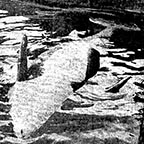 |
•Portland |
310 |
October 26, 2014 |
Scholarly Albany flyer was true father of Oregon aviationIn a race with Portland neophile Henry Wemme to be the first owner of an airplane in Oregon, Cornell-educated John Burkhart was two weeks too late; but unlike Wemme, he designed, built and flew his own machine. |
 |
•Albany, Portland |
309 |
October 19, 2014 |
Offer of bonus turned out badly for owner of wrecked shipOn the bright side, though, the owner of the Desdemona did get to go down in history — or, rather, geography — after the deadly sandbar that took his ship was dubbed Desdemona Sands. |
 |
•Astoria/ Columbia River Bar |
308 |
October 12, 2014 |
Port Orford PR wizard managed “secession” like a movie“Patriotic Jeffersonians intend to secede each Thursday until further notice,” the rebels said, and played their parts in the grand production to a nationwide audience as newsreel cameras rolled and reporters scribbled in notepads. |
 |
•Curry, Josephine counties |
307 |
October 5, 2014 |
Famous 1941 Jefferson “secession” largely a publicity stuntBoisterous and colorful man P.R. man Gilbert Gable, mayor of Port Orford, drew on the frustrations of the West Coast's remotest counties in an effort to get the state to invest in decent highways. |
 |
•Port Orford |
306 |
September 28, 2014 |
Oregon Indian prince was Japan's introduction to the WestIn his short 11-month stay, he taught 14 Imperial diplomats to speak English, and impressed them with his gentility and respectfulness. And after a long, adventurous life in Canada, his last word was, “Sayonara.” |
 |
•Astoria, Washington, Canada |
305 |
September 21, 2014 |
A secret Native American prince's quest to reach JapanYoung Ranald MacDonald didn't know he was the grandson of Concomly, Chief of the Chinook Tribe. But before anyone could tell him, he'd run away to sea — and in so doing, dramatically changed the destiny of three great nations. |
 |
•Astoria, Japan |
304 |
September 14, 2014 |
Legendary “Chief Bigfoot” as elusive as his hairy namesake1860s Bannock leader disappeared as mysteriously as he appeared, leaving behind nothing but frontier folklore and a trail of 17-inch-long moccasin prints; a probably-untrue rumor claims Nampa, Idaho, was named after him. |
 |
•Eastern Oregon |
303 |
September 7, 2014 |
Merrill brought bikes to women; prostitutes took 'em away“World's Greatest Trick Rider” sold more than 50,000 bicycles in an age when bikes were the cutting edge of technology; women loved them — until they started getting mistaken for hookers on the prowl ... |
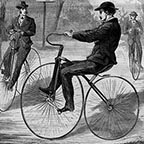 |
•Portland |
302 |
August 31, 2014 |
Portland stunt made local aero-daredevil world famous“This is an age of do-it-first,” said Silas Christofferson, and proceeded to launch his spindly kite-like “aeroplane” from the roof of a downtown motel — making aviation history in the heart of Oregon's biggest town. |
 |
•Portland |
301 |
August 24, 2014 |
Massive war game covered Central Oregon in 1943Tens of thousands of U.S. soldiers, shipped to the Beaver State for training, learned combat lessons that would save their lives and help them win the Second World War during the huge campaign simulation known as the Oregon Maneuver. |
 |
•Central Oregon |
300 |
August 17, 2014 |
Massive steamer wrecked by future Costa Rica Navy admiralAshamed to show his face in Astoria after causing the loss of the biggest passenger liner on the West Coast, Thomas Doig slunk away to South America and remade himself as a military man. |
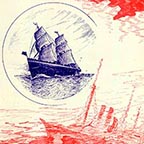 |
•Columbia River Bar |
299 |
August 10, 2014 |
Thousands of Oregonians remember replanting burnFor decades after the Tillamook Burn, classes of schoolchildren were bused out to help replant. Today, thousands of Oregonians, on trips to the beach, can point to a thriving patch of forest and say, “We planted those trees.” |
 |
•Tillamook National Forest |
298 |
August 3, 2014 |
Tillamook Burn “blew up” with shocking speedQuick action by state forester prevented the devastating forest fire from claiming hundreds of lives when a furnace-stoking wind blew in from Eastern Oregon, flogging the fire toward the sea. |
 |
•Tillamook National Forest |
297 |
July 27, 2014 |
Tillamook Burn sprang from logging crew's unwise gambleA hard-pressed crew tried to snake just a few more logs out before quitting for the day, hoping nothing would go wrong in the tinder-dry forest. Unfortunately, something did. |
 |
•Forest Grove area |
296 |
July 20, 2014 |
Bunco Kelley: The Coyote of Portland’s waterfront mythosIs there any truth to the stories of shanghaiings of the cigar-store Indian and of the dozens of dead guys found in the basement of a funeral parlor? Well ... maybe. But then again ... |
 |
•Portland waterfront |
295 |
July 13, 2014 |
Oregon's most notorious shanghai artist: “Bunco” KelleyHe was Portland's most notorious bad guy, with his fingers in everything from shanghaiing sailors to smuggling opium. But ironically, when he was finally sent to prison, it was for a murder he clearly didn't commit. |
 |
•Portland waterfront |
294 |
July 6, 2014 |
Rumors of sunken submarines: Government denies it, but ...Pulp writer and religious figure L. Ron Hubbard figures prominently in the most spectacular story of action against Japanese submarines in Oregon waters. It's known, with a smile, as the “Battle of Cape Lookout.” |
 |
•Oregon Coast |
293 |
June 29, 2014 |
Atlantis in the Beaver State: Underwater Lost Cities of OregonThe rising waters of lakes and reservoirs have submerged many budding Oregon metropolises over the years, from tiny one-horse towns to an entire Native American homeland. |
 |
•Various |
292 |
June 22, 2014 |
Pioneer Chinese doctor was a municipal treasure in John DaySettlers in John Day in the late 1800s learned the healer of Kam Wah Chung could cure diseases others couldn't; all his patients survived the fatal Spanish Flu epidemic in 1919. (Updated edition of this story) |
 |
•John Day |
291 |
June 15, 2014 |
Did Vortex music festival prevent riots in downtown Portland?On that tense late-August weekend, tens of thousands of young people enjoyed themselves at McIver Park, while the much-dreaded riots failed to materialize. Was there a connection? Many voters thought so. |
 |
•Estacada, Portland |
290 |
June 8, 2014 |
Governor McCall expected “Vortex I” to cost him the electionWhen McCall green-lighted the plan to distract potential street rioters with a week-long music festival, he fully expected to lose his job for it — whether it worked or not. |
 |
•Portland, Salem, Estacada |
289 |
June 1, 2014 |
Riot at PSU set the stage for “Governor’s Pot Party”To Governor Tom McCall, it looked like Portland was about to explode, and there was nothing he could do to prevent it ... until two long-haired young people came to his chief of staff with a very unusual plan. |
 |
•Portland, Salem |
288 |
May 25, 2014 |
Pirates were defeated in Yaquina Bay Oyster WarThe oysters belonged to the Siletz Indians and their employees, but Richard Hillyer was determined to take them anyway. We don't know much about the final battle, but we do know the outcome, and it must have been a doozie. |
 |
•Newport |
287 |
May 18, 2014 |
Portland's Pioneer Square could have been a “crystal palace”Mayor Frank Ivancie, Pioneer Courthouse Square's most intransigent opponent, gleefully declared the project “dead” in a 1982 speech. In doing so, he accidentally galvanized the citizen group that would prove him wrong. |
 |
•Portland |
286 |
May 11, 2014 |
NASA's “Moon Trees” have roots in an Oregon forest fireAstronaut Stuart Roosa had a special relationship with the U.S. Forest Service, and when it was his turn to go to the moon, he proposed a science experiment. You can see the results towering over Peavy Hall at OSU today. |
 |
•The Moon |
285 |
May 4, 2014 |
The mysterious disappearance of a schooner's entire crewPilot boat sailed back and forth on the Columbia River Bar all day and all night before finally crashing onto the beach; when onlookers ran to rescue the sailors, they found the boat empty and deserted. |
 |
•Astoria |
284 |
April 27, 2014 |
Japanese shipwrecks on Oregon coast likely predate ColumbusThe case of John Ottoson (ne Otokichi) in 1832 illustrates what can happen: Blown off to sea by a gale, he and his comrades rode the Kuroshio Current to Washington State — much to the astonishment of Dr. John McLoughlin. |
 |
•Oregon Coast |
283 |
April 20, 2014 |
Bad batch of “dehorn” alcohol killed 28 hobos on Skid RoadThe alcoholic derelicts of on Burnside Street knew they could count on denatured alcohol for a cheap-but-nasty buzz; it might make them sick, but it wouldn't kill them. But then, one day, it did. |
 |
•Portland |
282 |
April 13, 2014 |
Beavercreek Bomber: Give me $1 million or the lights go outCalling himself “J. Hawker,” David Heesh dynamited several high-voltage powerline towers, then threatened to keep it up unless ransom was delivered; the FBI busted him using a CB radio trick. |
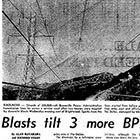 |
•Clackamas County |
281 |
April 6, 2014 |
Cayuse tribe's world-beating ponies are now very rareLegendary "Cayuse pony" breed gave Indians far more endurance and speed than settlers' mounts, a fact that cost gambler and horseman Joe Crabb most of his ready cash on "The Day Pendleton Went Bankrupt" |
 |
•Pendleton, Umatilla Indian country |
280 |
March 30, 2014 |
Iconic movies filmed in Oregon, Part Three: 1975-1989As a filming location, Oregon really started to come into its own in the 1980s, and many locals can point to key cultural touchstones that played out right in their home towns. |
•Astoria; Mt. Hood; Lane and Deschutes counties; Portland |
|
279 |
March 23, 2014 |
Iconic movies filmed in Oregon, Part Two: 1965-1975By the early 1960s, word started getting out in Hollywood about Oregon's virtues as a place to shoot on location. Productions made here during these eventful years follow changes in popular culture in an almost spooky way. |
•Salem; Deschutes, Lincoln, Lane and Baker counties |
|
278 |
March 16, 2014 |
Iconic movies shot in Oregon, Part One: 1908 to 1952As a place to go shoot pictures on location, Oregon has become pretty popular in the last few dozen years. But the Beaver State's contribution to early cinema, though more sparse, was surprisingly influential. |
•Astoria; Lane and Deschutes counties; Columbia Gorge |
|
277 |
March 9, 2014 |
Brutal “Oregon Boot” made our state prison famousNamed after the warden who invented it, the “Gardner Shackle” eventually caused serious musculoskeletal damage; many former inmates limped for the rest of their lives as a result of habitually wearing one. |
 |
•Salem |
276 |
March 2, 2014 |
After logger's murder, bordello madam mysteriously vanishedShortly after Charles Lyons' body was found, the owner of the bordello in which he'd been partying skipped town and was never heard from again. Could she have been his murderer? Or was she an unknown killer's second victim? |
 |
•Klamath Falls |
275 |
Feb. 23, 2014 |
Hank Vaughan in middle age: The outlaw as elder statesmanIn 1883, Eastern Oregon's wildest horse-rustling gunfighter gave up his stock-thieving ways (mostly) and became a wheat farmer. But to say he'd settled down wouldn't quite be accurate. |
 |
•Pendleton-Umatilla area |
274 |
Feb. 16, 2014 |
Hank Vaughan: Becoming the West's most successful rustlerThe Oregon frontier's most colorful almost-outlaw spent a dozen years dodging posses and slipping in and out of the Indian reservation with stolen horses and cattle. Some of his exploits are still being talked about today. |
 |
•Pendleton-Umatilla area |
273 |
Feb. 9, 2014 |
Legendary hell-raising rustler Hank Vaughan: The early yearsQuick to make both friends and enemies, Oregon's most famous frontier cowboy and almost-outlaw was a gifted horseman and rustler. But his hard-drinking, quick-shooting ways nearly got him lynched as a teen. |
 |
•Canyon City, Brownsville |
272 |
Feb. 2, 2014 |
Opium culture a long-forgotten part of the urban underworldA century ago, the drug had a dark, smoky allure for the "fast" young men and women of Oregon cities, and smuggling routes through Portland were supplying the entire West Coast with the exotic, deadly stuff. |
 |
•Portland and other cities |
271 |
Jan. 26, 2014 |
Charming gentleman by day, highway robber by nightCharles "Black Bart" Bolton's neighbors in San Francisco thought his money came from ownership in gold mines. It turned out it came from furtive excursions northward to rob stagecoaches in Oregon and northern California. |
 |
•Siskiyou Mountains |
270 |
Jan. 19, 2014 |
Portland is home of world's only working PT boat from WWIITwenty years ago, PT-658 was a weatherbeaten hulk, rotting away at a pier in San Francisco Bay. Today, it's a priceless piece of American history that you'll occasionally see on the waters of Portland Harbor. |
 |
•Portland harbor |
269 |
Jan. 12, 2014 |
Portland's Vaudeville mayor made city famous (and infamous)Adorably boisterous and hearty, Mayor George Baker was the life of every party. But if you were a supporter of organized labor or an anti-war activist, he and his "Mayor's Secret Police" goons were not your friends. |
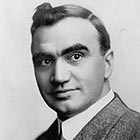 |
•Portland |
268 |
Jan. 5, 2014 |
The Oregonian once burgled a mayoral candidate's homeWill Daly had earned the sworn enmity of the newspaper's publisher, Henry Pittock, by exposing his plan to steal city water for his lush West Hills estate. But Pittock evened the score with a midnight visit to Daly's residence. |
 |
•Portland |